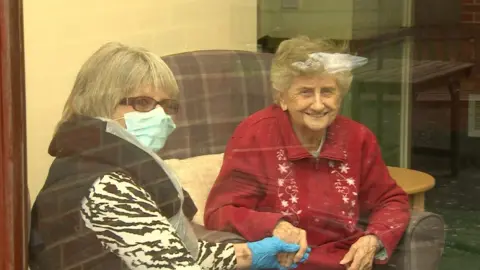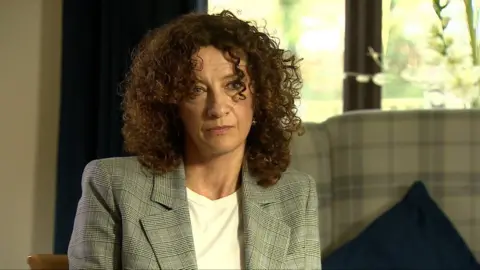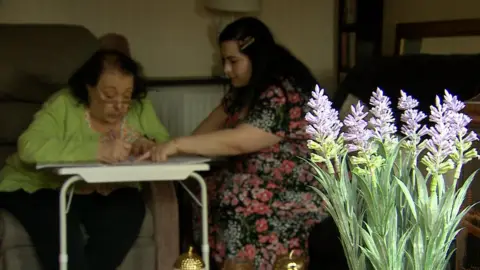Social care leaders warn of funding 'cliff edge'
 BBC
BBCLeading care organisations in England are warning of a "cliff edge" when emergency funding to support infection control and visits during the pandemic runs out in two weeks.
Some providers fear the financial pressure could force them to close.
They say the budget was a missed chance to tackle the short- and long-term funding crisis in adult social care.
In 2019, on his first day as prime minister, Boris Johnson committed to 'fix the crisis in social care'.
Ministers say they will bring forward proposals this year.
The emergency funds are to help care homes and home care services with additional Covid costs, including infection control, visiting measures and extra staffing.
Testing costs
The Victory Care home in Chatham, Kent, which normally cares for 60 people, has used some of its emergency money on staff to organise visits and testing.
"Everything from extra newsletters, Zoom calls, the telephone calls, and then there will be additional resources put into ensuring people are tested, ensuring the tests are logged so that we know what our team's results are," says Raina Summerson, chief executive of Agincare, which runs the home.
Gerry Smith, whose mother Julia moved there last October, is tested every time she visits.
"We haven't got out of the pandemic yet, so we still need to keep the precautions going for a bit longer until everyone's had the vaccine that's going to have the vaccine and the numbers have dropped," says Ms Smith.

But if emergency funding stops in two weeks, there are fears about the impact on care home visiting, testing and even the survival of some providers.
Ms Summerson says whilst Agincare is secure, the care homes and home care services she runs have seen wage bills rise between 10% and 18% during the pandemic.
But, she says, fee rates offered by councils and the NHS for the year ahead are mainly staying the same or increasing by 1-2%.
"We will still have costs related to additional staffing for visiting, we will still need to be doing testing regularly, we will still need to be doing robust - more so than usual - infection control procedures," she says.
"Who will suffer through this lack of funding? People who desperately need services, and our workforce who have given so much over this last year. It feels like a real slap in the face for them."
'Missed chance'
The seven organisations which signed the statement call themselves an "unprecedented alliance" of local politicians, council social service directors, care providers and people who need support.
They say the absence of social care in the Budget was "disappointing and a missed chance to provide much-needed certainty".
They want the government to publish its long-promised social care reform plan by the summer.
Long-term needs
Three years ago, Christie Michael and her mother Maria moved from one area where they were both eligible for council support to another with a very different approach.
Maria has regular epileptic seizures, renal failure and diabetes.
Christie has a rare condition that means her joints dislocate very easily.

But once they moved, Christie was not entitled to local authority funded help, and rather than four hours support a day, her mum was offered an hour and 15 minutes.
They say the council told them they would have to pay £75 a week towards the care.
"We decided to stop the care, we just could not afford it.
"We already needed food banks before when we were getting free care," says Christie.
She is now her mother's full-time carer.
"I feel like I owe her and I want to do it, but it means that I don't have a life and it means that my physical health and my mental health is declining as well."
Christie describes the care system as broken.
"I absolutely do not think you should get social care according to your postcode.
"It should be nationwide, available to everyone."
The full list of signatories is:
- Association of Directors of Adult Social Services
- Local Government Association
- Think Local Act Personal
- Care Providers Alliance
- Care and Support Alliance
- Social Care Future
- Social Care Institute for Excellence.
